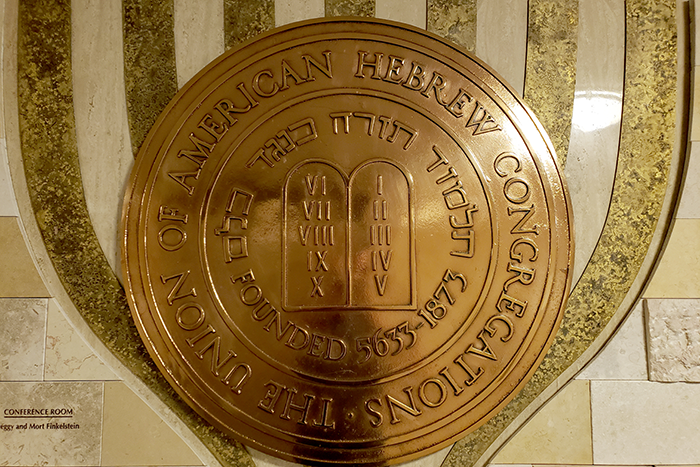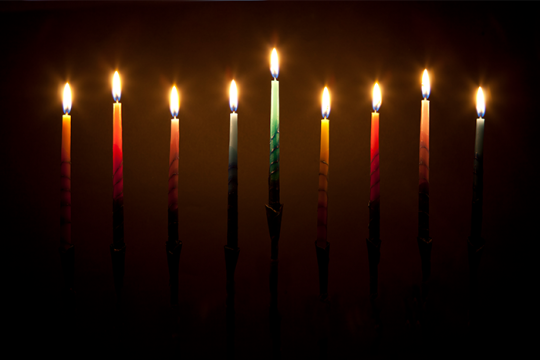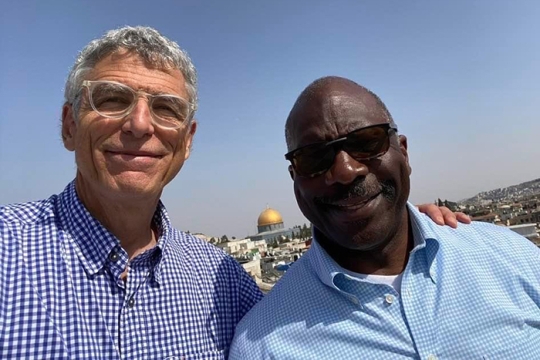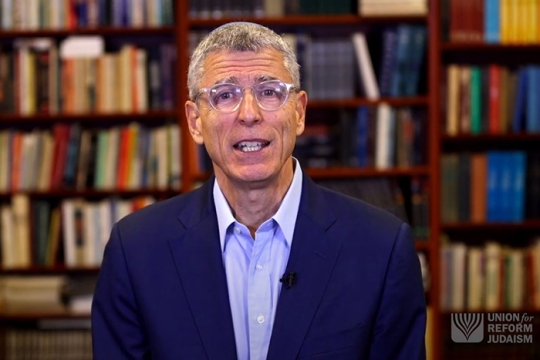
Twenty-eight congregational leaders met in Cincinnati in the summer of 1873 to establish the Union of American Hebrew Congregations (UAHC), which we now call the Union for Reform Judaism. And so, 150 years ago, the first of the founding institutions of the Reform Movement in North America was born.
It's worth remembering that the founder of our North American Reform Movement, Rabbi Isaac Mayer Wise, deliberately chose the word "union" for the names of our Movement (the Union of American Hebrew Congregations) and seminary (Hebrew Union College). Founded right after the Civil War, there was anything but unity in the United States or in our congregations across the north/south divide. Rabbi Wise hoped that, in the spirit of our prophetic tradition, we could help heal what was broken in the nation.
We would do well to remember that unity does not require unanimity, but it does require us to respectfully embrace the many facets of our diversity. We are still learning how people with varied views join together in sacred community while debating critical issues with respect and civility.
History shows us how difficult it can be to foster that vital civility. Rabbi David Einhorn, the first rabbi of Har Sinai in Baltimore and a firebrand of early Reform Judaism, was not shy about making dramatic changes in Jewish practice. His prayerbook, "Olat Tamid," was the precursor to "The Union Prayerbook," which radically reshaped the way Reform Jews prayed. He was also fearless in speaking up against the evils of his day. In 1861, Einhorn delivered a sermon which argued that the institution of slavery in the South was inconsistent with Jewish values. He noted that the biblical story of the enslavement of the ancient Hebrews in Egypt was a reason that Jews should be more sensitive to the plight of enslaved people in the United States. But after he courageously spoke out against slavery, he had to flee Baltimore for fear of his life.
What issues today divide us and lead us to speak uncivilly toward one another? Voicing unpopular progressive or conservative views about the new Israeli government? Spotlighting racism within the Jewish community or opposing the teaching of Critical Race Theory? Advocating for border security or immigration reform? Over the last 150 years there have been plenty of divisive issues facing our Movement here in North America, but today these divisions feel especially acute.
If we're going to be truly diverse, we need to consider all facets of diversity, and that means politics, too. Respecting a range of political opinions is as important as accepting others' views on God and Jewish practice. It is heartbreaking that some of our congregations are so polarized that big issues are not discussed for fear of further splintering our already divided communities.
I'm certain we can do better. Our congregations must be oases from the venom that is poisoning our public spaces. There are so few places where people who don't vote, think, earn, pray, or believe similarly gather on a regular basis. Our Jewish tradition has a deep practice when it comes to diversity of opinion.
Our congregations would be well served to learn and practice the Talmudic way of having sacred arguments. The Babylonian Talmud is, after all, a collection of arguments between sages who often vehemently disagreed but rarely disrespected their intellectual adversaries. Our sages didn't avoid tough issues or give up if they couldn't reach consensus. The debate was always civil, as in the case of the great debates between Hillel and Shammai -- eilu v'eilu divrei Elohim chayim -- these and these are words of the living God. The Talmud teaches in Mishnah Eduyot 1:5 that a minority opinion must be preserved to learn from in the future. Too often, that is not what happens in our communities or our society. Rather than see the holiness in the other, we seek to diminish and even vanquish those with whom we disagree.
Make no mistake: we must say out loud that not all positions are legitimate and there are not good people on all sides of every issue. We must also respect that there are more legitimate views than we regularly acknowledge. Intense, serious debates should only be exceeded by the depth of our respect for one another. Yes, authentic Jewish leaders must still raise their prophetic voices on the great moral issues of the day, but before we do, we need to consider others' views and test our own against them.
Reform Judaism was created to make certain that Judaism would be continuously updated and adapted to new circumstances, rather than remaining frozen in one historical iteration. Today, people are just as hungry for an up-to-date Judaism informed by eternal values. Though most are yearning for the spiritually progressive and ethically rigorous Judaism we live, many are unsure whether formal congregational membership is the path for them. Like those who came before us, we must continue to make these bold shifts; when we continue to make strategic changes, we create a path towards a bright future.
The Book of Exodus tells us that the penultimate plague inflicted on Egypt, darkness, was one of the worst. The 16th-century Italian commentator Sforno, who lived in the aftermath of the Inquisition in Spain, wrote that the darkness went beyond the mere absence of light: it was a tangible darkness, a darkness you could feel. We can empathize as we feel the darkness of intolerance, hate, bigotry, and zealotry today.
I know you join me in saying we will not let the darkness overtake the light. The light shines brightly when we celebrate the many authentic ways our people live out our Jewish commitment. The light shines brightly whenever we are partisans for justice, equity, and compassion.
As inaugural poet Amanda Gorman said: "There is always light. If only we're brave enough to see it. If only we're brave enough to be it."
Related Posts

5784 Hanukkah Message from Rabbi Rick Jacobs

What a Trip to Israel Taught Two Faithful Progressives

